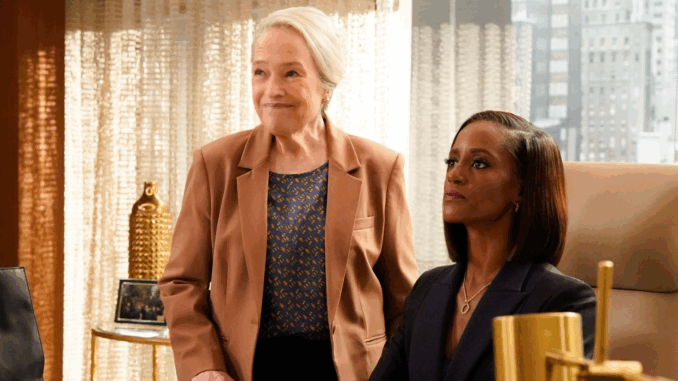
Old Name, New Vision
CBS’s reboot of Matlock may share a title with the classic 1980s courtroom drama, but its storytelling is firmly rooted in the present. With Academy Award winner Kathy Bates leading the charge as Madeline Matlock, the series reframes the traditional legal procedural for a world grappling with 21st-century challenges—where truth is elusive, power dynamics are complex, and justice isn’t always black and white.
Rather than leaning on nostalgia, the reboot uses the Matlock name as a launching point for a broader conversation about the law and those who practice it. Madeline, unlike her predecessor Ben, isn’t a small-town Southern lawyer in a seersucker suit—she’s a retired attorney with a sharp mind and a sharper tongue, returning to a high-powered law firm in New York. It’s a bold, calculated move that pays off.
Kathy Bates Brings Edge and Humanity
At the heart of the show is Bates’s performance, which is at once fierce and emotionally nuanced. Her Madeline Matlock doesn’t bluff her way through cases; she listens, calculates, and picks her battles. Her return to legal practice is fueled not by ambition but by principle—often clashing with a legal culture that favors billable hours over moral clarity.
What makes Madeline compelling is her refusal to play the game by modern rules. She trusts her instincts more than digital research, favors paper files over cloud databases, and isn’t afraid to challenge the younger, more tech-savvy lawyers around her. Her methods may be unconventional, but her results are undeniable.
Tackling Today’s Most Pressing Legal Questions
The cases featured in Matlock reflect the issues of today—whistleblower protections, gender discrimination, AI and intellectual property, and racial bias in policing. The show doesn’t shy away from uncomfortable truths, and it often ends with outcomes that feel more realistic than tidy.
In one standout episode, Madeline defends a corporate executive accused of insider trading, only to uncover a much larger conspiracy involving data manipulation and investor fraud. Another episode examines wrongful termination in the context of social media backlash, illustrating how fast public opinion can affect legal outcomes.
This commitment to timely storytelling gives Matlock a sharp edge over more formulaic procedurals. It forces viewers to ask difficult questions and leaves room for moral ambiguity—a rarity in courtroom dramas.
A Cast That Balances Conflict and Camaraderie

The ensemble cast supports Bates’s performance with a mix of tension and warmth. Jason Ritter’s Julian provides a foil as a polished, pragmatic partner who underestimates Madeline at first, while Skye P. Marshall’s Olympia begins as a skeptic but slowly grows to admire Madeline’s conviction. David Del Rio’s Billy adds levity as the firm’s tech guru, often baffled by Madeline’s analog approach.
These relationships evolve with each episode, offering more than just workplace banter. They explore generational divides, differing values, and the struggle between institutional loyalty and doing what’s right.
Why the Reboot Works
CBS didn’t just update the characters and setting—they updated the stakes. Viewers aren’t just watching courtroom victories; they’re watching a woman fight for relevance in a system that often sidelines age, experience, and compassion. Matlock shows that legal knowledge doesn’t expire, and that even in a fast-paced digital world, wisdom earned the hard way still matters.
Importantly, the show doesn’t lean too heavily on Bates’s celebrity. While she is unquestionably the center of attention, the scripts give breathing room to the broader cast and cases. It’s an ensemble show disguised as a star vehicle, which adds to its rewatch value and emotional payoff.
Looking Ahead
As Matlock continues its first season, fans and critics alike are curious to see how the show will deepen Madeline’s backstory. What led her to retire in the first place? What haunts her about past cases? And could a romantic subplot emerge, or will Madeline remain solely committed to her work?
One thing is clear: Matlock isn’t just a courtroom drama. It’s a thoughtful, character-driven series that proves legal storytelling can evolve while honoring its roots. If the rest of the season maintains this balance, CBS may have found its next great procedural.